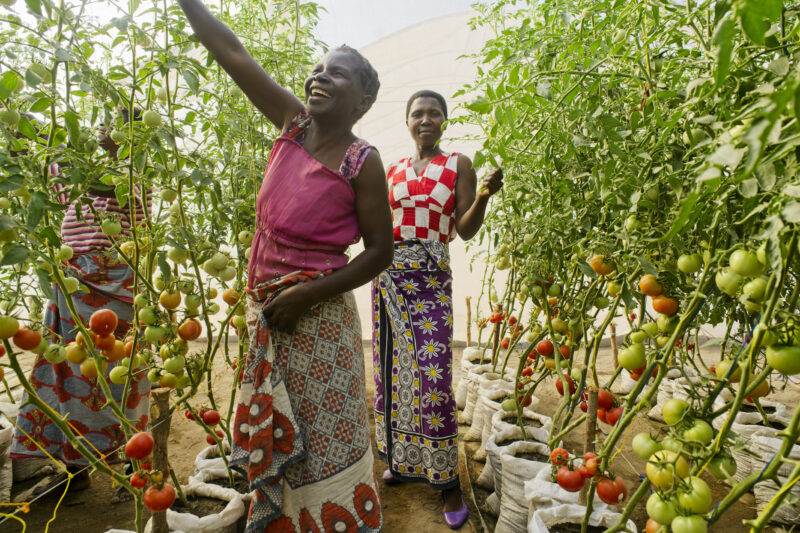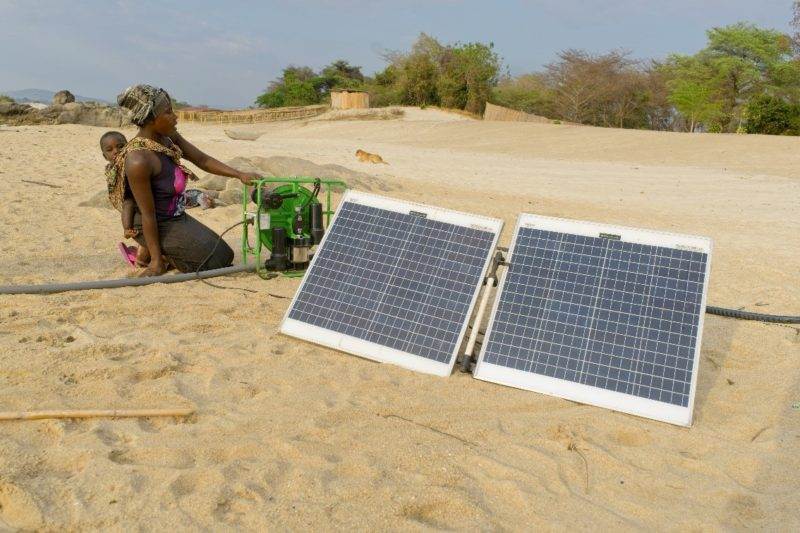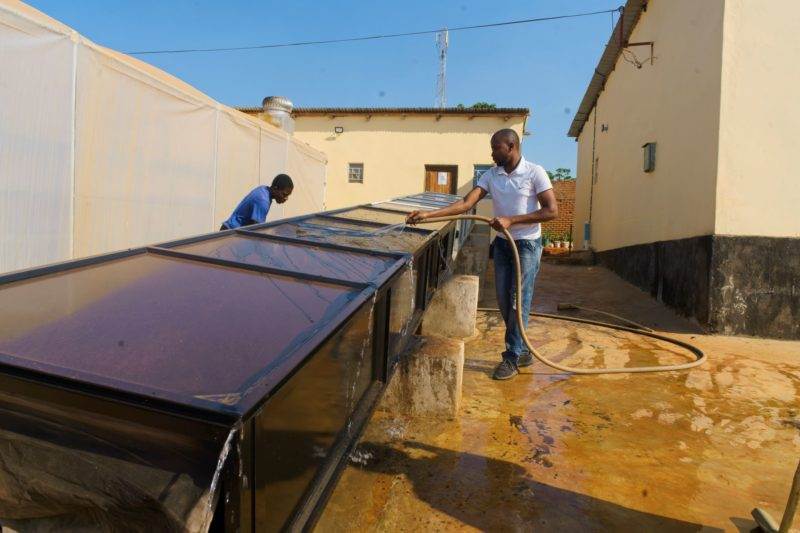Off-Grid Success: Solar Chilling Fuels Malawi’s Produce Supply Chain
Discover how solar chilling is revolutionising the supply chain for quality produce in an off-grid community in Malawi. By combining modern farming techniques, solar irrigation, and a walk-in solar chiller, this innovative approach is empowering women farmers, reducing post-harvest losses, and creating new market opportunities.
“As a former chef, I know good produce when I see it, the tomatoes MFT supplies are good quality.” – Agness Band, Procurement Officer at Sunbird Mzuzu Hotel
With post-harvest loss affecting up to 50 per cent of softer crops in Malawi, Modern Farming Technologies and Practical Action have been working with women farmers to both grow and preserve tomatoes and develop a supply chain of fresh produce to new markets.
This holistic business model was developed in June 2020 in collaboration with project stakeholders and is overseen by Modern Farming Technologies, a local social enterprise based in northern Malawi. Through a contract farming system, the model works directly with rural women farmers in Chinteche who grow tomatoes using modern farming techniques such as improved seed varieties, greenhouse farming and solar irrigation kits to increase production.
The women supply their produce to MFT on a weekly basis. A walk-in solar chiller built using an old shipping container located near the farms is used to store produce improving preservation, shelf-life, and the quality of produce for supply to a range of wholesale food markets. Experience to date, indicates that women farmers could earn over 900 USD a year, over 80% of the value of the living income for an entire household in the area.
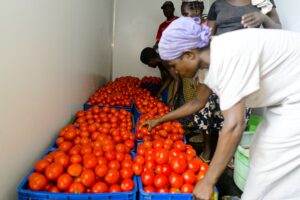
Women farmers off-load harvested tomatoes into the solar chiller
The model only works if there is a market for the produce. Over the past 18 months, two types of markets have developed.
Sunbird Mzuzu Hotel, one of Malawi’s popular resorts with over 7 branches across the country, has been one of the larger supply contracts MFT signed a few months into the project. We caught up with Agness Banda, the hotel’s procurement officer who first heard about MFT through the head chef at the hotel. The chef informed Agness that he had heard about a social enterprise supplying good-quality tomatoes. She then reached out to Prisca Gama from the sales team at MFT who brought in samples and a contract was established.
Agness remarked, “Buying high-quality produce at an affordable price for the hotel’s catering services is what I do on a day-to-day basis. I joined Sunbird Mzuzu Hotel as a chef in 2008, working part-time while training in procurement. After graduating, I became the procurement officer here and my job is to manage catering services. As a former chef, I know good produce when I see it, the tomatoes MFT supplies are good quality.” Sunbird Hotel currently purchases 250 – 300kg of tomatoes 3 times a week, making 30,000 MWK (USD 30) per week in saving, and most importantly, there have also been no interruptions with supply.
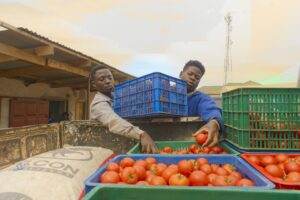
MFT Staff supplying tomatoes to retailers in Chinteche Town, Malawi.
There have also been some surprising developments with other market types.
Kevin Simpson, the chairman at MFT explains “As more women signed onto the project, we anticipated that we would supply produce to formal retail outlets across northern Malawi. Our capacity to supply more markets has increased, the women farmers we work with are harvesting over 1000kg of tomatoes every week. What we’ve noticed however is that the local market is thriving with most of our consumers being members of the community and the local food market in nearby towns. Turns out there’s both a local and national market for our produce, it’s a win-win.”
Local women traders buy majority of the tomatoes and sell them at local farmers’ markets across Chinteche. Fyness Bota, a local entrepreneur and kiosk owner explained that the benefits of sourcing tomatoes from MFT include their offer of good quality, a fixed market price and a consistent supply all year round. “When I sold the first batch of tomatoes, my first impression was that the quality was better than what other vendors sell in the local market because they have a long shelf life even when they are stored at room temperature.” Before sourcing produce from MFT, Fyness would buy tomatoes from other farmers. “In northern Malawi, tomatoes are generally available in the market, but with varying seasons, the quality of the produce fluctuates. During the rainy season, which usually runs from November to March, the quality and quantities are low because farmers struggle to grow tomatoes during the cold season.”
Fyness began a trial run by buying a 20kg crate of tomatoes which she sold within 4 hours. Surprised about how fast they were selling, she decided to retail tomatoes from MFT more regularly. In total, she now purchases 4 to 5 crates a week. She explained that because tomatoes are a household necessity, sales are easy to make, and bring higher and more consistent financial returns when compared to some of the other produce she sells such as eggs. Her final remarks were that she would like to set up a greenhouse before the end of the year and start growing tomatoes. “I am interested in the seed variety MFT grows and would like to grow them when I get the money to establish my own greenhouse. I am a poultry farmer, but my hatcher keeps failing because of a lack of electricity. If I invest in tomato farming, I will be able to receive my first harvest within 2 to 3 months and make profits by the third month investing.”
At the project’s inception, MFT and Practical Action were hopeful that the business model would be a success. In 2020, John Chettleborough, Agriculture and Markets Lead at Practical Action stated that “If our business model is successful, this scheme can transform the local economy both for the farmers and through a raft of other economic benefits for suppliers, buyers and transporters.” Twenty months into the project, the business model is headed in the right trajectory as the supply chain of fresh produce in Chinteche expands.
Learn more about our work with smallholder farmers and the transformative impact of innovations like solar chilling on farming in remote parts of the world. Together, we can continue to empower communities and build sustainable, resilient food systems. For an overview of the project read here.
